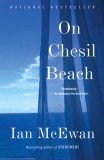Summary | Excerpt | Reading Guide | Reviews | Beyond the Book | Readalikes | Genres & Themes | Author Bio

Critics' Opinion:
Readers' Opinion:
First Published:
Jun 2007, 208 pages
Paperback:
Jun 2008, 224 pages
 Book Reviewed by:
Book Reviewed by:
BookBrowse Review Team
Buy This Book
And they had so many plans, giddy plans, heaped up before them in the misty future, as richly tangled as the summer flora of the Dorset coast, and as beautiful. Where and how they would live, who their close friends would be, his job with her father’s firm, her musical career and what to do with the money her father had given her, and how they would not be like other people, at least, not inwardly. This was still the era—it would end later in that famous decade—when to be young was a social encumbrance, a mark of irrelevance, a faintly embarrassing condition for which marriage was the beginning of a cure. Almost strangers, they stood, strangely together, on a new pinnacle of existence, gleeful that their new status promised to promote them out of their endless youth—Edward and Florence, free at last! One of their favorite topics was their childhoods, not so much the pleasures as the fog of comical misconceptions from which they had emerged, and the various parental errors and outdated practices they could now forgive.
From these new heights they could see clearly, but they could not describe to each other certain contradictory feelings: they separately worried about the moment, sometime soon after dinner, when their new maturity would be tested, when they would lie down together on the four–poster bed and reveal themselves fully to each other. For over a year, Edward had been mesmerized by the prospect that on the evening of a given date in July the most sensitive portion of himself would reside, however briefly, within a naturally formed cavity inside this cheerful, pretty, formidably intelligent woman. How this was to be achieved without absurdity, or disappointment, troubled him. His specific worry, based on one unfortunate experience, was of overexcitement, of what he had heard someone describe as “arriving too soon.” The matter was rarely out of his thoughts, but though his fear of failure was great, his eagerness—for rapture, for resolution—was far greater.
Florence’s anxieties were more serious, and there were moments during the journey from Oxford when she thought she was about to draw on all her courage to speak her mind. But what troubled her was unutterable, and she could barely frame it for herself. Where he merely suffered conventional first-night nerves, she experienced a visceral dread, a helpless disgust as palpable as seasickness. For much of the time, through all the months of merry wedding preparation, she managed to ignore this stain on her happiness, but whenever her thoughts turned toward a close embrace—she preferred no other term—her stomach tightened dryly, she was nauseous at the back of her throat. In a modern, forward–looking handbook that was supposed to be helpful to young brides, with its cheery tones and exclamation marks and numbered illustrations, she came across certain phrases or words that almost made her gag: mucous membrane, and the sinister and glistening glans. Other phrases offended her intelligence, particularly those concerning entrances: Not long before he enters her…or, now at last he enters her, and, happily, soon after he has entered her…Was she obliged on the night to transform herself for Edward into a kind of portal or drawing room through which he might process? Almost as frequent was a word that suggested to her nothing but pain, flesh parted before a knife: penetration.
In optimistic moments she tried to convince herself that she suffered no more than a heightened form of squeamishness, which was bound to pass. Certainly, the thought of Edward's testicles, pendulous below his engorged penis—another horrifying term—had the potency to make her upper lip curl, and the idea of herself being touched “down there” by someone else, even someone she loved, was as repulsive as, say, a surgical procedure on her eye. But her squeamishness did not extend to babies. She liked them; she had looked after her cousin’'s little boys on occasion and enjoyed herself. She thought she would love being pregnant by Edward, and in the abstract, at least, she had no fears about childbirth. If only she could, like the mother of Jesus, arrive at that swollen state by magic.
Excerpted from On Chesil Beach by Ian McEwan Copyright © 2007 by Ian McEwan. Excerpted by permission of Nan A. Talese, a division of Random House, Inc. All rights reserved. No part of this excerpt may be reproduced or reprinted without permission in writing from the publisher.





The House on Biscayne Bay
by Chanel Cleeton
As death stalks a gothic mansion in Miami, the lives of two women intertwine as the past and present collide.

The Flower Sisters
by Michelle Collins Anderson
From the new Fannie Flagg of the Ozarks, a richly-woven story of family, forgiveness, and reinvention.

The Funeral Cryer by Wenyan Lu
Debut novelist Wenyan Lu brings us this witty yet profound story about one woman's midlife reawakening in contemporary rural China.
Your guide toexceptional books
BookBrowse seeks out and recommends the best in contemporary fiction and nonfiction—books that not only engage and entertain but also deepen our understanding of ourselves and the world around us.